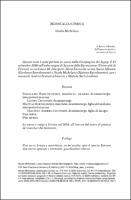Chapter Didascalia comica
| dc.contributor.author | Michelassi, Nicola | |
| dc.date.accessioned | 2022-06-01T12:17:32Z | |
| dc.date.available | 2022-06-01T12:17:32Z | |
| dc.date.issued | 2020 | |
| dc.identifier | ONIX_20220601_9788855181501_440 | |
| dc.identifier.issn | 2704-5919 | |
| dc.identifier.uri | https://library.oapen.org/handle/20.500.12657/56257 | |
| dc.description.abstract | The first part of this paper consists of a theatre play written specifically for the international congress El teatro Español en Europa and performed on that occasion by the Segugi theatre company. The play stages the generational and poetic conflict between two seventeenth-century Florentine playwrights: the tragedian Girolamo Bartolommei (1584-1662) and his son, the comedian Mattias Maria (1640-1695). Girolamo, contrary to the innovations of modern comedy and the mixture of tragic and comic, dedicated in 1658 a treatise entitled Didascalia comica to Mattias in which he sought to bring his son to traditional positions; nevertheless, Mattias became a leading exponent of that new Spanish imitation comic theatre that, since the times of Giacinto Andrea Cicognini (1606-1649), had found in Florence a fertile place of reworking and diffusion. The second part offers a critical note on the historical issues illustrated in the pièce. | |
| dc.language | Italian | |
| dc.relation.ispartofseries | Studi e saggi | |
| dc.subject.other | Florentin theatre | |
| dc.subject.other | Didascalia comica | |
| dc.subject.other | Girolamo Bartolommei | |
| dc.subject.other | Mattias Maria Bartolommei | |
| dc.subject.other | Giacinto Andrea Cicognini | |
| dc.subject.other | Iaccopo Cicognini | |
| dc.subject.other | Spanish theatre | |
| dc.title | Chapter Didascalia comica | |
| dc.type | chapter | |
| oapen.identifier.doi | 10.36253/978-88-5518-150-1.29 | |
| oapen.relation.isPublishedBy | bf65d21a-78e5-4ba2-983a-dbfa90962870 | |
| oapen.relation.isbn | 9788855181501 | |
| oapen.series.number | 209 | |
| oapen.pages | 18 | |
| oapen.place.publication | Florence |

